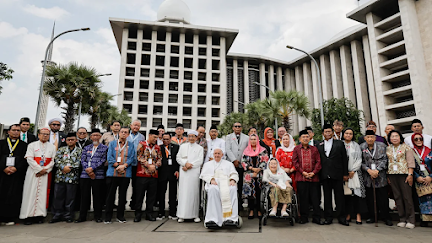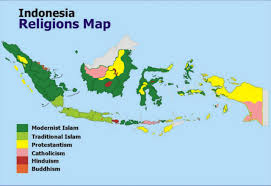When I hear that Pope Francis is off on another tour on behalf of the Roman Catholic Church my eyebrows go up. He is 87 years old, uses a wheelchair, and is in and out of hospital regularly due to respiratory issues. You might figure he deserves a break from leaving the Vatican due to age and infirmity.
At the moment Pope Francis is in Indonesia, a predominantly Muslim country -- there are more Muslims in Indonesia than any other nation. Yet while only about 11 percent of the population is Christian that's about 29 million people, about 10 million more than in Canada.
Indonesia is religiously pluralistic and espouses religious freedom but there are times when Christians are keenly aware of their minority status. The presence of Pope Francis serves as an encouragement to Christians of every flavour and the warm welcome he has received from Muslim leaders is important. Frail as Francis might be, there is no other Christian leader in the world who would receive this sort of attention by a government, those who represent other religions, and from the international press.
We can certainly pray for the health of Pope Francis and for the ways in which he is building inter-faith and ecumenical bridges. I admire this aspect of his papacy immensely. Read this from CNN
Since his papacy began in 2013, Pope Francis has signaled his intention to build bridges with other faiths. The global growth of Islam, and the rise of extremism across religions, also made this an urgent priority.
On Thursday, in the biggest mosque in the world’s largest Muslim-majority nation, the pontiff used a joint statement with Indonesia’s Grand Imam Nasaruddin Umar to pinpoint “two serious crises” facing the world: dehumanization and climate change.
“The global phenomenon of dehumanization is marked especially by widespread violence and conflict, frequently leading to an alarming number of victims,” said the statement, signed in the sprawling capital Jakarta.
“It is particularly worrying that religion is often instrumentalized in this regard, causing suffering to many, especially women, children and the elderly,” it continued. “The role of religion, however, should include promoting and safeguarding the dignity of every human life.”
On climate change, the declaration stated that “human exploitation of creation” had led to “various destructive consequences such as natural disasters, global warming and unpredictable weather patterns,” and an “obstacle to the harmonious coexistence of peoples.”



No comments:
Post a Comment